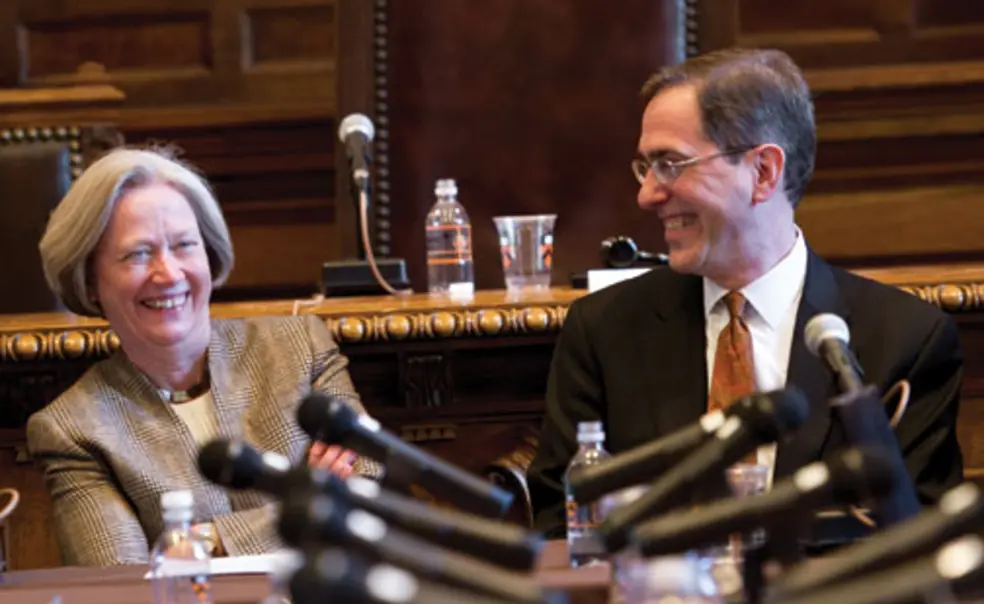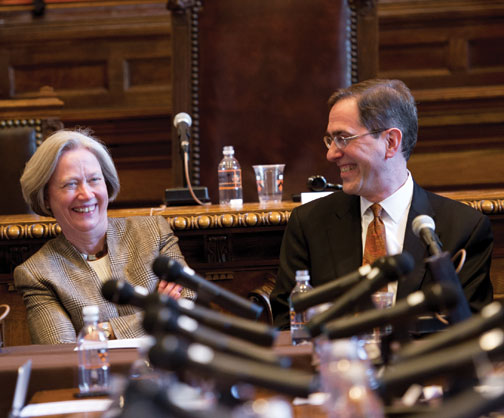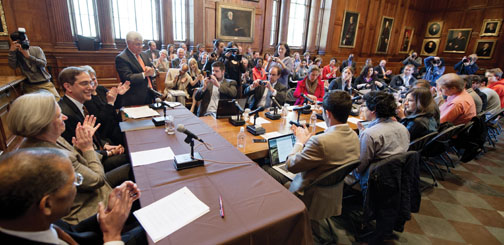Princeton taps its provost to become next president
Christopher L. Eisgruber ’83, a constitutional scholar who has been Princeton’s provost since 2004, was selected by the Board of Trustees April 21 to become the University’s 20th president. He will succeed President Shirley Tilghman, who announced last fall that she would step down June 30.
“It is a great joy for me to accept this appointment,” Eisgruber said at a Nassau Hall press conference held after the trustees’ vote.
Kathryn A. Hall ’80, chairwoman of both the board and the search committee, said the trustees voted “enthusiastically and unanimously” for the new president. She said the board had sought a candidate both to “sustain our current success” and to steer the University through what could be “a period of real change” for higher education and “most likely for Princeton as well.”
Hall expressed the board’s confidence that Eisgruber, 51, “has the skills, personal qualities, and devotion to Princeton to lead our University with vision, imagination, courage, and conviction.”
Eisgruber will be the first undergraduate alumnus to be president since Robert Goheen ’40 *48; the first lawyer since Woodrow Wilson 1879; and the first president without a Ph.D. since Francis Patton, who served from 1888 to 1902. He majored in physics, but a Princeton course in constitutional interpretation taught by Walter Murphy turned him in a different direction.
At the press conference, Eisgruber described a place at the University as “a gift — one that can transform the life of any student, faculty member, or other scholar who is lucky enough to receive it, and we have an obligation to ensure that this gift is fully available to the entire range of people who can benefit from it.”
He set forth a series of questions he believes the University must answer: How can the University ensure that a Princeton education is accessible and beneficial to the greatest possible range of people? How can Princeton ensure that its research addresses the questions that matter most to the nation and the world? How can Princeton fully engage every student on campus? What does the advent of online education mean for Princeton, and how should the University participate in it? How can Princeton cooperate with colleges that “share our scholarly ideals and mission” but face severe financial or political pressure?
Responding to those who question the value of a college degree as costs have escalated, Eisgruber insisted that “a college education, and a good liberal-arts education with demanding reading and writing requirements, is more valuable now than it has been at any time in our history.” He elaborated on this in an interview with PAW, saying it would be a mistake if there were efforts to make education “less expensive by making it less good. Good education matters, but if there are ways that we can keep education equally good or even better while making it less expensive, that is something that is important for Princeton and it’s important for higher education.”
In an interview with The Daily Princetonian, Eisgruber signaled that he would continue the administration’s policies on some of the more contentious student issues of Tilghman’s tenure, voicing support for the grade-deflation initiative, the ban on freshman rush, and multiclub bicker.
A 17-member search committee met for more than six months and interviewed a broad range of candidates, Hall said. Although Eisgruber was widely considered to be a leading contender, Hall said his selection was not foreordained. As trustee Brent Henry ’69, vice chairman of the search committee, explained, “it was important for us to take the time we needed to make sure we got the right person.”
Immediate reaction to Eisgruber’s selection was positive. “I think we have in Chris the leader that we are going to need for the next decade or so, and I don’t think we could be in better hands,” Tilghman said.
David Dobkin, dean of the faculty, described Eisgruber as a good listener who holds strong opinions but is “willing to talk something out for as long as it needs to be talked out.” Caroline Hanamirian ’13, co-winner of the Pyne Honor Prize, took a freshman seminar taught by Eisgruber on “Elite Universities, Public Policy, and the Common Good” and praised his willingness to make time for undergraduates. “Amidst all of his teaching and administrative responsibilities, Professor Eisgruber always welcomes students into his office with open arms,” she said.
New Jersey Gov. Chris Christie, an ex-officio member of the board who attended the session, lauded the selection, noting Eisgruber’s long association with Princeton: “He’s not going to need a manual about this place.”
Some of Eisgruber’s classmates recalled his strong work ethic and sharp wit, which was amply in evidence at his first press conference. “I always feel like 15 minutes spent talking to him is the equivalent of a year’s education at Princeton, only cheaper,” Paul Epply-Schmidt ’83, a former roommate, wrote in an email.
Marilyn H. Marks *86, W. Raymond Ollwerther ’71, and Nellie Peyton ’14 contributed reporting to this story.
As a constitutional scholar, Christopher Eisgruber ’83 has spoken and written about issues such as freedom of religion, gun rights, and the rights of people accused of terrorism. Click here to read a sampling of excerpts.














3 Responses
Alexandra Cristea ’09
10 Years AgoFinding a sense of purpose
I have received with much enthusiasm the announcement of Christopher Eisgruber ’83’s appointment as president.
I am an alumna, Class of 2009. After four years out of school, I have had the chance to reflect further on my education at Princeton from the lens of my own experience, as well as through discussions with other alumni. Princeton is a very exciting and very, very challenging place to be. One of the things that differentiated my experience there from that of other students was my sense of purpose.
Having come from a low-income background in Romania, I was the grateful recipient of the University’s generous financial aid. It was stressful to know that I could not rely on my parents after graduation for either job connections or financial support. However, that motivated me to pursue all the opportunities available on campus. Even in the darkest moments, I knew why I was there. I knew that getting a B- on a hard 300-level math or econ course was not the end of the world, because in the end, I had learned a lot, gained significant skills, and opened my mind and my heart in many ways through incredible friendships.
I contrast my experience with other alums who now have found their way, but have told me that they felt lost, sad, depressed, and ready to quit Princeton many times through the four years. It was not because they were not incredibly talented and bright, but because they had found themselves missing a sense of purpose while throwing themselves relentlessly into the endless partying, social climb, drugs, and drive to be part of the most prestigious eating clubs. I had seen the same many times as an undergraduate academic consultant with the McGraw Center. The kids coming there were not any less able to manage their time, read fast, or do problem sets than anyone else. They instead were more disillusioned with the culture and the environment. Beyond the many students who talk about leadership and win prestigious Rhodes and Marshall scholarships, there are the countless others – smart, incredible, some making an impact in silent ways, some struggling terribly. Among my friends, the students that made the most of their time there were those who had a higher sense of purpose.
As I have been thinking through these issues, I realized that the undergraduate class may benefit from a focus on finding that sense of purpose.
The curriculum requiring ethical and moral values classes is good, as are the countless opportunities in extracurriculars and research. But I am thinking of a program that would be more cohesive, and could imprint different facets of student life:
I recently came across the “Work on Purpose” program put together by Echoing Green, the social-entrepreneurship network and incubator (http://www.echoinggreen.org/our-programs/work-purpose). I am sure there are many other organizations that do similar things.
After graduation, I worked one year with Innovations for Poverty Action in Colombia, two years with the Boston Consulting Group in New York, and for 10 months I have been the finance director of Jacaranda Health, a maternity hospital in Kenya. I am not coming from the perspective that everyone should work in the NGO/development sector after graduation. Even if they want to do so, I would advise all students to improve their skill set first, whether those skills lie in research, engineering, business, or project management. I believe this could benefit all students by helping them decide what motivates them, what they want to do, and how to be more resilient in getting there.
Overall, I believe this could have important benefits for students:
Anonymous
10 Years AgoBUZZ BOX: Eisgruber's selection sparks alumni kudos
Alumni greeted the choice of Provost Christopher Eisgruber ’83 as Princeton’s new president (Campus Notebook, May 15) with positive comments at PAW Online.
“It is great news to finally have an undergraduate alumnus as president!” wrote ERIC NOEHRENBERG ’88. “I believe that it is really important to have a leader who has been through the University program as an undergraduate. ... He will thus have a clearer view of the needs of the students.”
ROGER K. FISHER *63 said he applauded Eisgruber’s selection and looks forward to “what should be a very interesting and productive tenure. Princeton has been a training ground for college and university presidents.”
Commenting on excerpts of Eisgruber’s writings and speeches posted at PAW Online, FRANK W. GOBETZ ’58 wrote: “Our new president displays an analytical mind. He understands precedent, but isn’t bound by it.”
JEFFREY A. KEHL ’70 summed up his reaction this way: “We have hit a home run with President Eisgruber!”
Richard J. Balfour ’71
10 Years AgoA risky presidential choice
After 25 years of exceptionally strong leadership by Canadians, was it really wise of the trustees to abandon that strategy for the choice of the president and instead to take the risk of an American (Campus Notebook, May 15)?